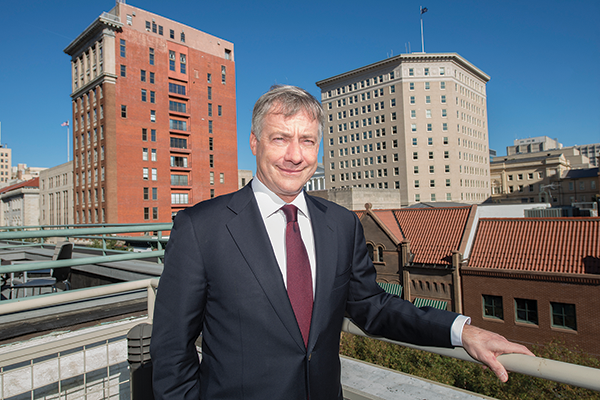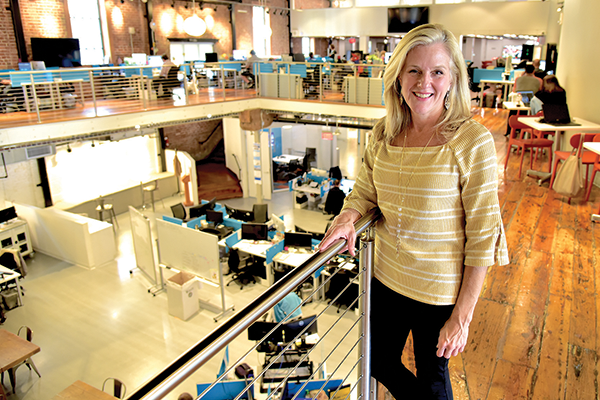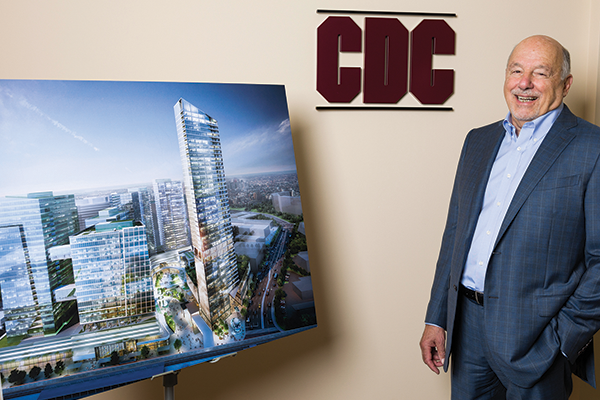Back to the center
Companies return to downtown to up their ‘cool’ factor and appeal to millennials
Richard Foster //October 27, 2017//
Back to the center
Companies return to downtown to up their ‘cool’ factor and appeal to millennials
Richard Foster //October 27, 2017//
In the 1940s and 1950s the American Dream changed. Driven by white flight and the construction of post-World War II planned communities, families began migrating in ever-larger numbers from cities to the suburbs, seeking subdivisions with spacious homes and lawns big enough for playing children.
As a larger percentage of the workforce fled for the suburbs, companies followed, building office parks and sprawling, collegelike campuses.
Since the Great Recession, however, that trend has been reversed. Today, an increasing number of companies are relocating headquarters and other significant operations to urban areas that appeal to in-demand millennial workers.
Interestingly, many of these corporations also are eschewing big cities such as New York and Los Angeles in favor of opening offices in midtier cities where the cost of living is lower and employees can enjoy a greater quality of life.
The areas that have the most to gain from this new exodus are midsize capital cities such as Richmond; Raleigh, N.C.; and Austin, Texas, says Barry Matherly, president and CEO of the Greater Richmond Partnership.
While Richmond boasts big-city amenities such as universities, museums and performing arts centers, Matherly says, office space costs less and commutes are far shorter when compared with nearby cities such as Washington, D.C.
“It’s easy to attract talent from other areas to Richmond,” he adds. “Young people can afford to buy a house here if they want. They can actually afford to live here.”
Several corporations have decided to move to Richmond’s downtown recently, especially to the Riverfront Plaza office towers. It’s the home or soon-to-be home for new offices for Hanover County-based medical supplies company Owens & Minor Inc.; Washington, D.C.-based International City/County Management Association – Retirement Corp. (ICMA-RC); Canadian news and information company Thomson Reuters; and New Jersey-based software developer AvePoint.
Washington, D.C.-based CoStar Group, a leader in commercial real estate data and analytics and the parent company of websites such as Apartments.com, opened a new headquarters facility for its research division in the WestRock building downtown, within walking distance of the James River. It has hired about 600 of 830 planned employees for the location.

For CoStar, one of the most important factors in deciding to open a major location in downtown Richmond was its proximity to Virginia Commonwealth University. “Workforce pipeline for us is vital. We need an educated workforce,” says Florance, whose company has hired hundreds of millennial employees in Richmond during the last year.
Retention also was a key consideration for CoStar. “Our researchers build relationships with commercial real-estate professionals all over the country,” Florance says, and his clients don’t like turnover. In Richmond, CoStar can spend less on office space while paying workers at the same rate as counterparts in larger cities. “Richmond just lets that investment in them go a lot further,” he says. “They can have a much higher quality of life in Richmond than they would anywhere else.”
When ICMA-RC was looking for sites in the Richmond area, economic development officials at first showed the company a suburban office park, but ICMA-RC wasn’t interested. “We want to be downtown,” says Gregory Dyson, the company’s senior vice president and chief operating officer.
Millennials make up about 30 percent of his company’s total workforce, Dyson says, and “they want to be where the action is. They’re looking for the excitement of the city.” And with a host of rooftop bars, eateries, galleries and nightspots — not to mention river activities like whitewater rafting and kayaking — downtown Richmond fits the bill.
Companies also may be able to count on keeping their younger workers interested in downtown locations for longer. Millennials are marrying and settling down far later than previous generations and “stay in the city a lot longer,” says David J. Collis, an adjunct professor at Harvard Business School.
It’s not just millennials who are drawn to cities, he adds. Empty-nesters and executives also are excited by vibrant downtowns. And with high-speed internet and advances in telecommunications, corporations are beginning to de-aggregate their suburban campuses and split into divisions, with their corporate leadership moving back to cities. General Electric, for instance, is building a $200 million complex in downtown Boston, with plans to move its top brass there from Connecticut.
There also is a symbolic value to inhabiting trendy downtown spaces, lending companies the appearance of keeping up with the times. Plus, companies see value in breaking out of isolated campuses, says Collis, exposing their people to a more diverse “innovative, entrepreneurial milieu.”

Located on the Canal Walk in downtown Richmond, the building features an open work layout, with exposed brickwork, wood floors and high ceilings — a very different space from CarMax’s suburban corporate campus about a half-hour away.
“We’re looking for people who are creative, innovative, technologically proficient, etc., and that want to work in this very progressive, collaborative way,” says Ann Yauger, CarMax’s associate vice president of product. “Downtown just offered so much of a rich diversity of thinking, of people, of environment and stimulation.” The Lady Byrd Hat Co. Building appeals “to different people,” she continues, “and those folks don’t want to work in a suburban environment as much.”
Richmond isn’t the only Virginia city experiencing a downtown corporate rebirth.
In Norfolk, Automatic Data Processing (ADP), a New Jersey-based Fortune 500 human resources firm, has invested more than $32 million to locate an office with 1,800 workers downtown.
Amid renewed vibrancy buoyed by millennial-friendly craft breweries and an influx of new apartments, Roanoke also is attracting new tenants. In September, Associated Asphalt, one of the largest asphalt resellers in the country, and PowerSchool, an education technology company, signed leases to relocate to the former Norfolk Southern building in the city’s downtown.
Meanwhile in Fairfax County’s fast-growing Tysons corporate district, millions of square feet of office space are under development as Tysons morphs into a model for live-work-play. Capital One Financial Corp. is renovating its 24-acre corporate campus into a complex that will include a 470-foot-tall, 940,500-square-foot skyscraper for its corporate headquarters. The new campus also will offer apartment towers, retail outlets and an urban-style Wegmans grocery store.

Many millennials, Clemente and others note, aren’t interested in driving to work and would rather walk or bike. When they need to drive, they prefer Uber or public transit. That’s why the popular live-work-play urban planning model resonates particularly well with them.
The growth at Tysons, Clemente says, is an acknowledgement that suburban corporate campuses of yesterday won’t attract tomorrow’s workers.
“Office parks are dead,” he says bluntly. “The millennial workforce is not going to go to an office park — period. If you own an office park, you better start thinking about something else to do with it.”
r












